The Electronic Intifada 12 June 2017
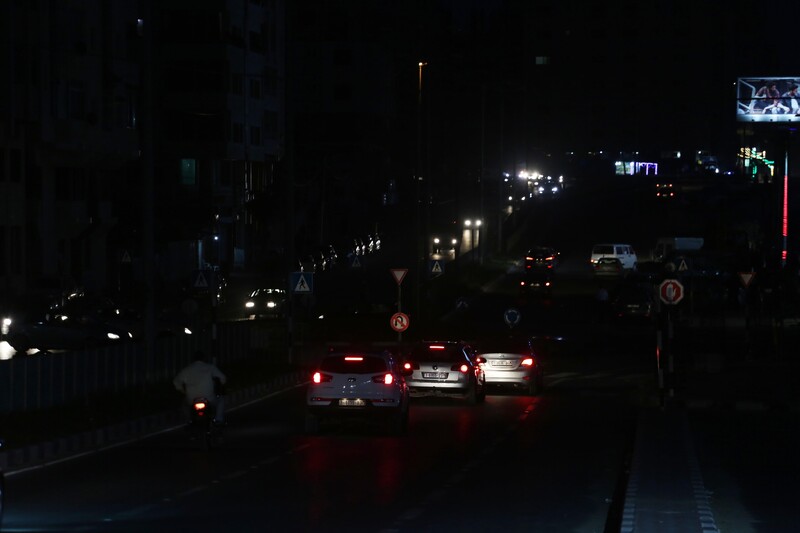
Gaza City’s Beach Street, a busy thoroughfare connecting the southern and northern areas of the Strip, is often in total darkness. During power cuts the lights go out along Gaza’s most trafficked streets, plunging the roads into darkness and causing accidents.
Palestinians in the occupied Gaza Strip have endured a chronic electricity crisis since Israel imposed an economic blockade on the territory 10 years ago.
The territory’s electricity infrastructure has been targeted and damaged during successive Israeli military offensives, and Israeli import restrictions have hindered repair.
An Egyptian crackdown on tunnels through which cheaper fuel was smuggled into Gaza exacerbated the situation in 2013.
Rolling blackouts now last 20 hours per day after Gaza’s sole power plant shut down when it exhausted its fuel supply in mid-April. Resupply has been delayed due to an ongoing dispute between the Palestinian Authority in the West Bank and Hamas in Gaza over high taxes on diesel fuel and the collection of payments from electricity consumers.
Currently, there are only four hours of electricity per day in Gaza, and that is about to decrease as Israel moves to cut its electricity supply to the territory by 40 percent.
Hospitals have become dependent on generators and solar-based sources that can keep vital equipment running for a few hours when there is no electricity.
Power cuts disrupt the operation of water pumps and wells, with water supply to households currently standing at four to eight hours every four or five days.
Wastewater plants have been forced to shorten treatment cycles, causing 120 million liters of untreated sewage to flow into the Mediterranean Sea each day.
The crisis has led the International Committee of the Red Cross to warn that Gaza is on the brink of “systemic collapse.”
Reportage by Mousa Tawfiq, a journalist based in Gaza and photos by Mohammed Asad, a photojournalist based in Gaza.
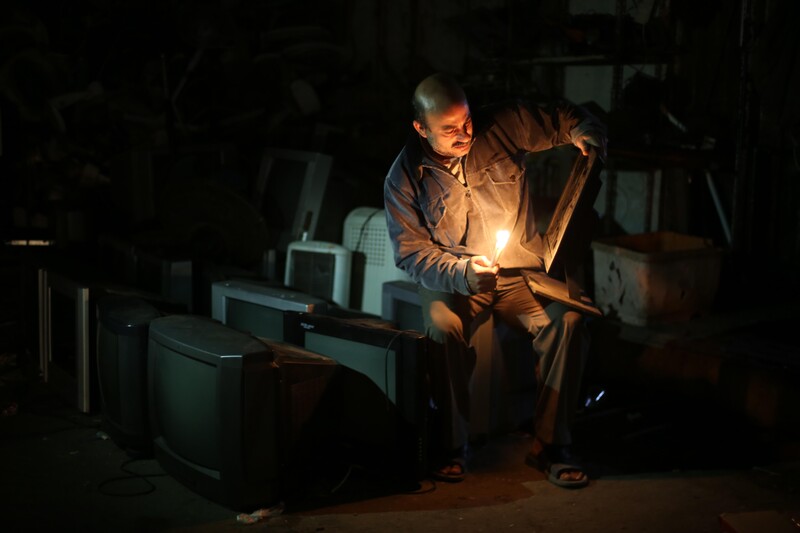
Mahmoud Banat, 47, used to run one of the biggest appliance repair and retail shops in Gaza City’s Beach refugee camp. “I took this profession from my father. I’ve done my best to keep up with new technology and the daily improvements in this field.”
Banat said the chronic power cuts in Gaza have caused damage to appliances, and some residents have bought equipment to protect their devices from potential harm caused by outages.
“As you can see, my shop is full of broken and disabled televisions and electrical devices. People are suffering and losing a lot of money to fix their devices. People prefer energy-saving televisions that can be powered with generators and batteries. Some types of televisions consume a lot of power and they aren’t widely used these days.”
Banat’s business hasn’t benefited from the situation.
“When the electricity crisis began in 2006, I started to face difficulties at my shop as I couldn’t work during the power cuts,” he said. He sold his shop and moved into a smaller one, where he currently only does repairs, and no longer sells appliances.
“It’s a disastrous situation. My life is completely destroyed and I have five children; two of them are university students.”

In addition to harming Mahmoud’s business, the electricity situation has put pressure on his wife, Najwa Banat, 42.
“We suffer from a water crisis as there is no electricity to run water pumps at the houses,” she said while preparing a cup of tea.
“I can’t do any housekeeping. I have to get up after midnight to wash clothes and clean the house. I make sure to keep the candles away from the hands of my children. I’m always stressed and feeling uncomfortable. We live in a very difficult situation surrounded by hardships and daily challenges.”

In 2010, Ahmad Rajab, 26, opened his barbershop in Gaza City.
“Eight years ago, when I finished school, my family didn’t have enough money to pay my university fees. Some of my relatives advised me to learn a simple trade that people always need. I decided to master the skill of shaving and I had a diploma from a certified training center.”
From day one, Rajab had to contend with the electricity crisis.
“At the beginning, I bought a small generator to use during power cuts. When we were using the Egyptian fuel, I needed $6 a day just for fuel. Nowadays, with the Israeli fuel, which is three times more expensive, I need $18. I don’t think that I’ve ever earned more than $20 a day.”
“I bought those rechargeable shavers for $100. They are not cheap, but it is my only choice to keep working.”
“I hope to have a better tomorrow and for this crisis to be solved. We have begun to believe that it’s our destiny to not have a better life. It’s like a nightmare without end.”

Hussam al-Sousi, 24, took his mother and two sisters to Gaza City’s corniche to escape from darkness and boredom. They found that the corniche was darker than their house.
“We came here for some relief, but it is all the same. We are very lucky to have the car headlights,” he said.
Hussam, a law school graduate, works at his father’s garment factory.
“Even our work is affected. We used to work in the morning. Now, we organize our work according to the electricity. Sometimes we have to work after midnight using generators with expensive fuel.”
For Hussam’s mother, Sanaa al-Sousi, 45, the power cuts cause other woes: “My daughters’ midterm exams were in the last week. They had to get up very early to study [when the electricity was on]. Studying by candlelight gave my youngest daughter Leila a headache. I don’t know what we are going to do if the crisis lasts until the final exams.”
For Leila, 8, there are additional consequences: “There is no ice cream in the shops. I don’t know what I’m going to eat during summer.”

“I sell grilled and boiled corn on the beach. I work here during summer because the beach is full of people, while in winter, I sell vegetables in a small booth at the market,” said Mahmoud Ghanim, 26. “I’m a father of two sons and my wife is pregnant with a girl. I have no choice but to work hard.”
Ghanim, who lives in Beach refugee camp, said that he had to leave school at the age of 15 to work with his father as a fisherman. His family’s trade has been badly affected by the Israeli naval blockade and constant violence against Gaza fishermen by Israeli forces.
“It wasn’t an easy choice, but I couldn’t risk my life for a job that could barely feed my children,” he said.
Ghanim found his own solution to be able to work during the dark nights – a solution which cost him the equivalent of a week’s earnings.
“Before the current crisis, I didn’t face any problems at nighttime because Beach Street was always illuminated, but now we are in darkness. I paid $40 to buy a battery, a charger and a power-saving light to use when there is no electricity.”
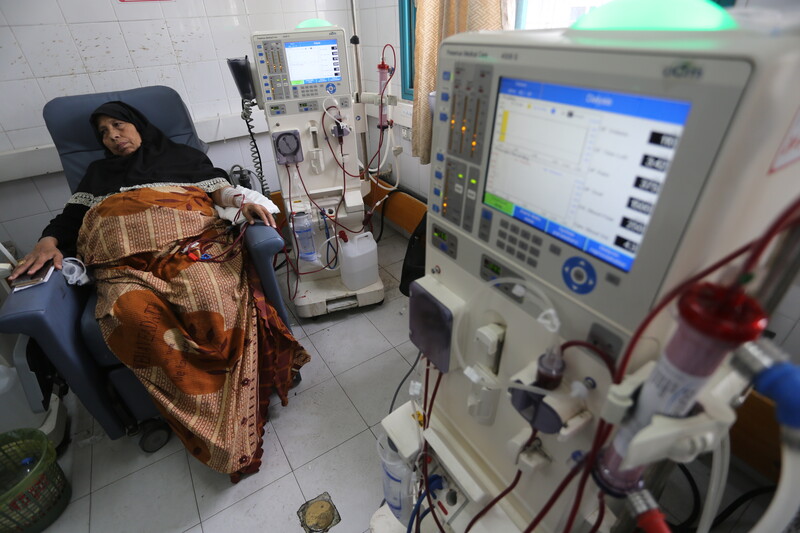
Suha Ashour, 68, has been going to al-Shifa hospital in Gaza City for dialysis treatment for a decade.
“In 2007, I had a heart attack. The medical treatment and the consequences of the heart attack affected my kidneys. I have to go to the hospital three times a week for dialysis sessions.”
Ashour, a mother of six, said that the four-hour sessions are exhausting, especially during summer.
“After the sessions, when I return home, I feel suffocated and I can’t stay in hot weather. My sons brought me an air conditioner, but most of the time there is no electricity and it’s very difficult for me at this age to stay in such circumstances.”
Ashour said hospital staff have warned her and other patients that their dialysis treatment may be disrupted by power cuts.
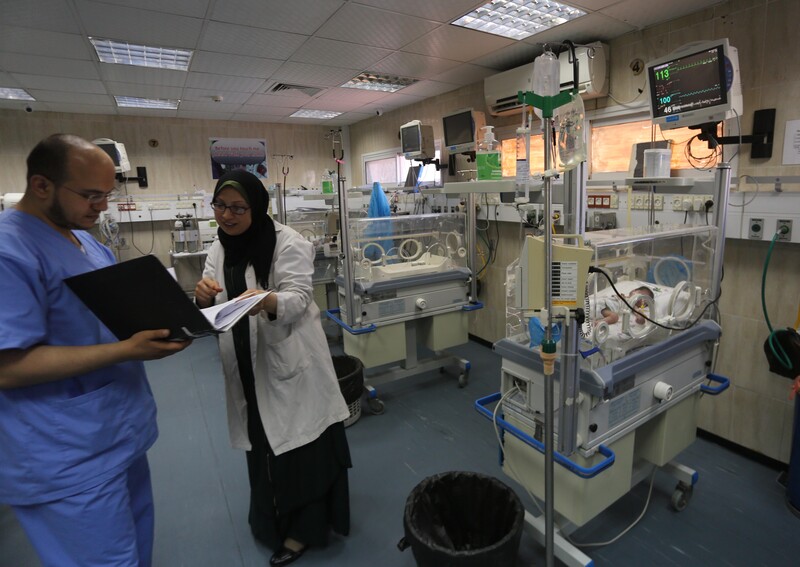
In 2012, the neonatal unit at al-Nasr children’s hospital in Gaza installed a solar power system to ensure the running of their equipment. The unit receives 100 to 200 patients per month and any power cut can put infants’ lives in jeopardy, according to its coordinator Dr. Shireen Abed.
“We deal with very sensitive cases aged between zero and 28 days. Our unit receives three to five patients per day and all the equipment needs electricity: incubators, monitors and ventilators,“ she said.
“When the solar power system needs periodic maintenance, the situation becomes catastrophic. We transfer the neonates to other units to be attached to the required devices. The power cuts pose a real danger to the lives of our children in the unit, but the solar system provides us with the needed power.”
“I can’t imagine the situation without this solar power system,” she added.
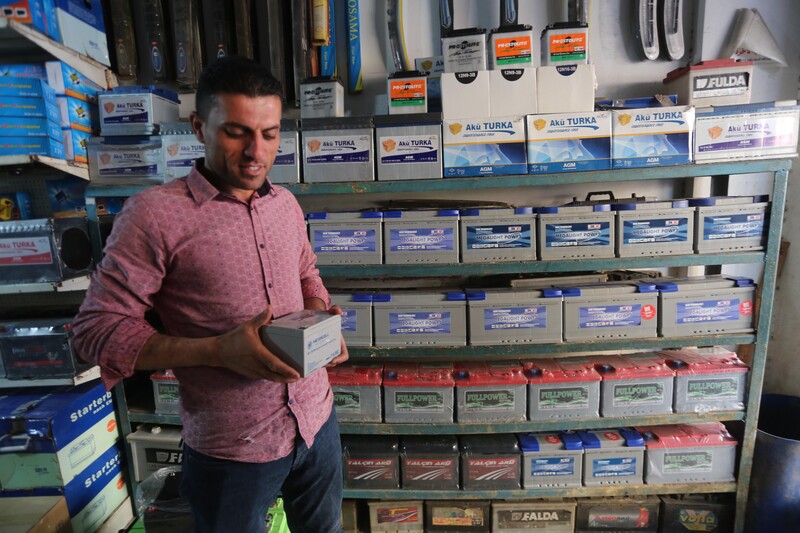
Palestinians in Gaza have used backup generators to provide electricity to their houses and shops. But the high price of the Israeli fuel, $2 for a liter, is out of reach for many in the territory, where unemployment rates are the highest in the world.
“People didn’t use batteries or solar cells in their houses before 2014, they used generators,” said Ziad al-Rayashi, 32, the owner of a batteries and solar cells shop in Gaza City. “Using the generator for eight hours each day costs an average family more than $480 a month. No one can afford it.”
Al-Rayashi sells alternatives that don’t require fuel.
“Engineers invented new methods. We use car batteries to generate electricity by charging the battery and using it for lighting and watching television.”
A car battery charging system cost $1,200 a year ago, according to al-Rayashi. This price was far out of reach for the average Gaza resident – especially after the last cuts to civil servants’ salaries by the Palestinian Authority in the occupied West Bank – so retailers slashed prices to increase demand. He now sells the system for $650.
Despite the price drop, people prefer smaller battery charger systems used just for lighting and Wi-Fi. “This more simple system costs $40 and it can barely light a room, but people can’t afford the bigger one,” al-Rayashi said.
“We do our best to provide our people with the cheapest devices, despite all the difficulties we face. We pay a lot of taxes to the Israeli side to get our goods from their ports and crossings.”
Though Gaza gets more than its fair share of sun, the use of solar power is very limited.
“It’s cleaner and better, but very expensive. The most simple solar power system costs $1,700 just for lighting and television. The upper class are the only people who can buy this system,” al-Rayashi said.
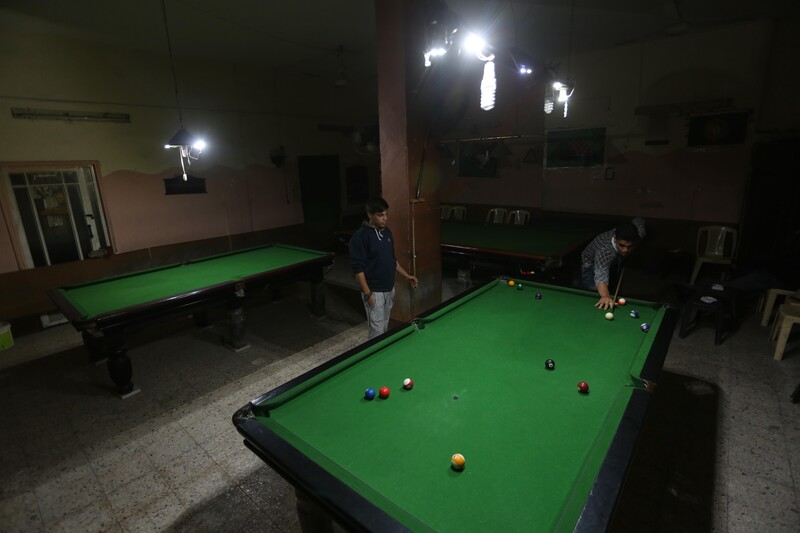
University student Khalid Mahdi, 19, and his friend Hussam al-Khatib, 20, play billiards at a small shop in Gaza City.
“We escaped from the poor LED lighting at our houses to find the same lighting at the billiards hall,” Mahdi said.
“Playing billiards is a hobby and we do our best to practice it regularly, but we can barely see the balls with these lights,” he added. “Every Gazan has these lights at his house and complains of their bad quality. But we don’t have other choices.”
“We are university students. We can’t study with bad lighting and we can’t practice billiards for the same reason,” al-Khatib said.
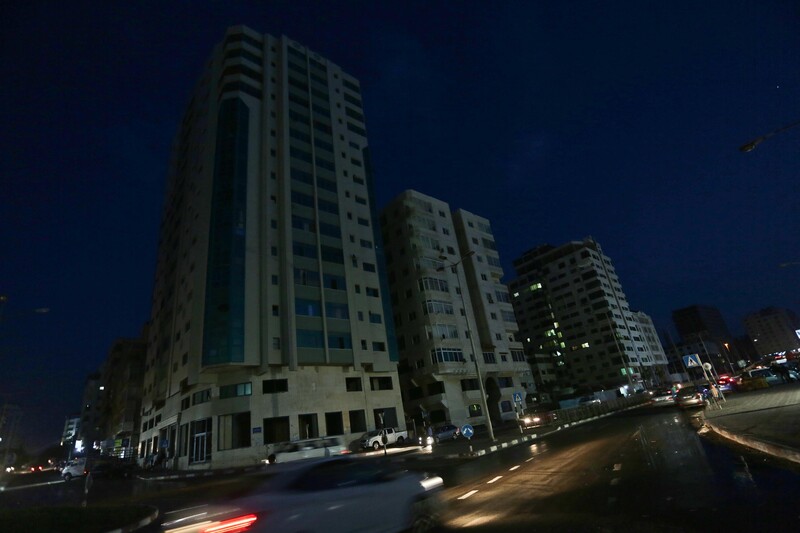
Most buildings and workshops have big generators which are usually put in the street, causing noise pollution. Yet even towers have stopped using them due to the long hours of power cuts and the cost of the fuel needed to power the generators.
Police officer Ahmad Musallim, 42, lives on the eighth floor of the Sea Tower in Gaza City.
“The generator works for 10 minutes every two hours for the elevator, and from 6 pm to 9 pm every day. If a person wants the elevator [outside the fixed time], he must pay 5 shekels [approximately $1.50] to turn on the generator.”
“My children go to school. After six hours of class, they have to walk up eight flights of stairs. I wish I could do anything to help them.”
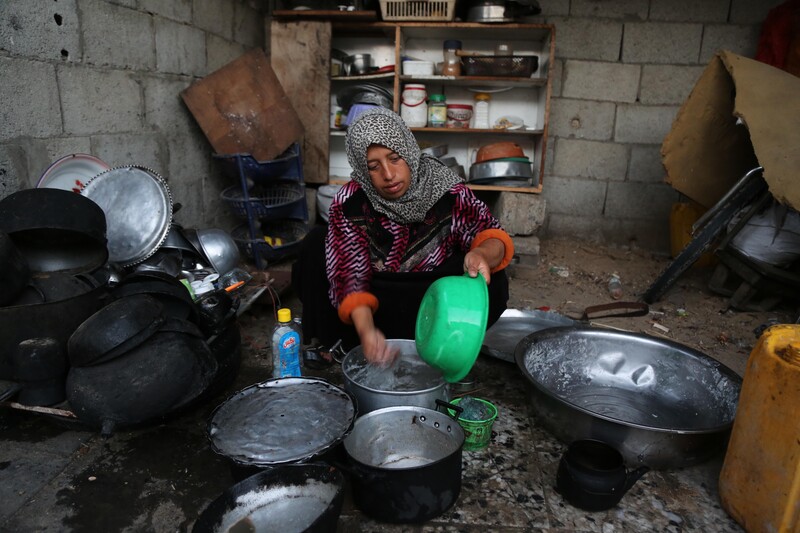
“Power cuts have become a part of our life. We have already adapted to living with long hours of darkness,” said Fatima Qudaih, 42, in Khan Younis, southern Gaza.
“The long power cuts prevent us from using the water pumps. It’s the nightmare of every housewife here in Gaza. We can’t wash clothes or dishes.”
“My son takes some jerrycans and fills them at a nearby water station. It’s more expensive and much more difficult to use,” she added.
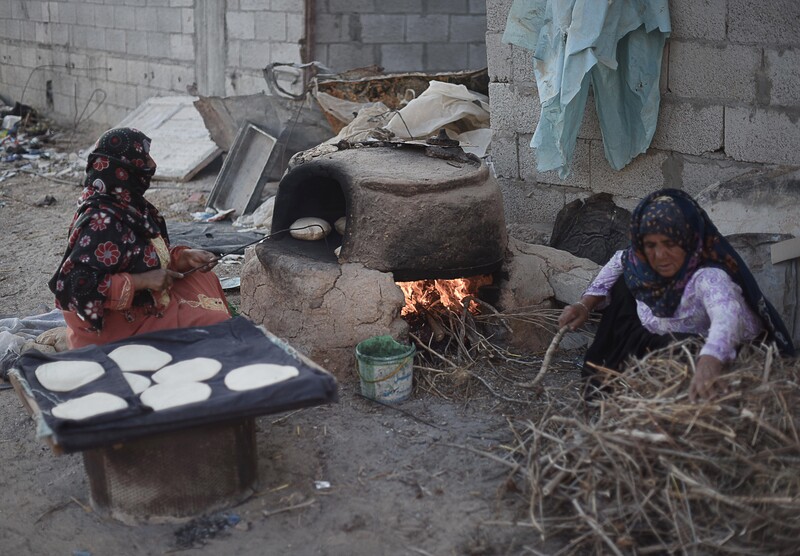
Wafaa al-Najjar, 63, and her sister Samiha, 60, use a clay oven to bake and cook at their home in Khan Younis.
“We used to use an electric heater for baking, but now we use this oven, especially since cooking gas is expensive,” Wafaa said.
The sisters use tree branches from their farm for the fire. “We live in a rural area. Women in these areas are strong and rely on themselves. We know that our life is difficult, but we do our best to keep going. We simply don’t have any other choice,” Wafaa said.
According to Samiha, the bread baked on the electric heater tastes better, but the one made in the clay oven reminds them of their mother.

Ahmad al-Jahjouh, 52, a carpenter in Gaza City, said that his work is “paralyzed” with only four hours of electricity each day.
“Sometimes the four hours of electricity are during the night. At first, I was coming to my shop with my workers and we worked after midnight. But the neighbors complained because of the noise, which I fully understood.”
“I used to have 20 workers in this shop. Now, it’s just me and my two sons. We produce nothing. And even when we use the generator, our profit is negligible.”
“I have nothing to say. I don’t sleep and I’m very tired. We have been suffering for years and our patience has run out.”





